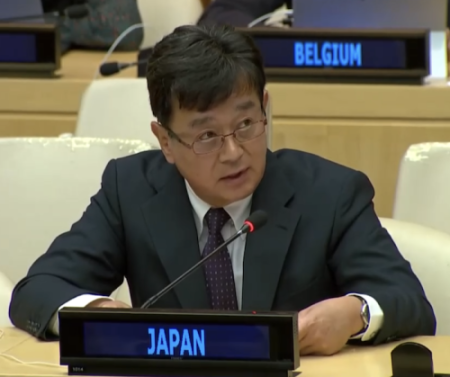2022年経済社会理事会(ECOSOC)人道セグメントにおける大菅大使ステートメント

(As delivered)
I would first like to thank you, Mr. Chair, for convening the Humanitarian Affairs Segment in person for the first time in four years in New York.
The number of people in need of humanitarian assistance has risen to an unprecedented level, driven by compounded threats to human security, including those caused by climate change and the COVID-19 pandemic.
In addition, the world is witnessing a humanitarian catastrophe caused by unceasing violent conflicts in Asia, Africa and other regions, the most recent being Russia’s aggression against Ukraine in blatant violation of the international law. As we have seen time and again, those in the most vulnerable situations, especially women and children, are being affected disproportionately. Moreover, the suffering transcends borders, with concerns over the dramatic deterioration of food security as a result of serious disruption to global food supply chains caused by the situation in Ukraine.
Mr. Chair,
I would like to highlight three points that Japan considers crucial in addressing the ongoing humanitarian crisis. First, with regard to increasing number of conflicts, which continue to drive even more complex and dire humanitarian situations, I would like to reiterate that international humanitarian law must be fully respected, including the protection of civilians and civilian infrastructure, not least those of humanitarian and medical nature, and that full, safe and unhindered humanitarian access must be safeguarded.
Second, in addressing the global crises, regardless of their causes, be it infectious disease, natural disaster or violent conflict, the UN system has the comparative advantage in its capacity to deliver on the ground. However, despite the decades-long debate on the humanitarian-development nexus, and the “triple nexus” in more recent years, multiple barriers remain. This is what Japan stressed in the ECOSOC Operational Activities for Development Segment, and I wish to stress the same points in this Humanitarian Affairs Segment.
Third, in the face of ongoing multidimensional crises, I would like to recall that the UN system must grasp the situation on the ground through a human security lens and take actions that nurture the potential of people as “agents of change” and focus on prevention-oriented solutions to the ever-evolving threats to individual human beings.
I would like to conclude my remarks by reiterating what Japan called for in the Development Segment. “At the end of the day, what really matters is how much we deliver to those most in need.”
Thank you very much.
